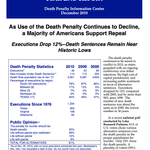The Death Penalty in 2010: Year End Report
Posted on Dec 21, 2010

PRESS RELEASE Top
DPIC’s Year End Report: Executions Down 12% Nationwide, 29% in Texas; Death Sentences Near Historic Lows
2010 Election Results Confirm Poll Finding Majority Favor Alternative Punishments and Will Support Politicians Who Vote for Repeal of the Death Penalty
(Washington, D.C.) The country experienced a 12 percent decrease in executions in 2010 compared to 2009 and a more than 50 percent drop compared to 1999, according to a report released today by the Death Penalty Information Center (DPIC). Texas had 29 percent fewer executions in 2010 than the previous year
DPIC projects that the number of new death sentences will be 114 for 2010, remaining near last year’s number of 112, which was the lowest number since the death penalty was reinstated in 1976. Death sentences declined in all four regions of the country over the past ten years, with a 50 percent decrease nationwide when the current decade is compared to the 1990s.
“Whether it’s concerns about the high costs of the death penalty at a time when budgets are being slashed, the risks of executing the innocent, unfairness, or other reasons, the nation continued to move away from the death penalty in 2010,” said Richard Dieter, DPIC’s Executive Director and the report’s author.
Although the recent elections brought a dramatic shift in political alliances, candidates who questioned the death penalty were elected across the country, including governors in California, Connecticut, Maryland, Massachusetts, New York, Kansas, and Illinois.
For example, Jerry Brown and Kamala Harris were elected as governor and attorney general of California, despite heavy TV ads attacking them as death penalty opponents. Daniel Malloy, who opposes the death penalty, was elected governor of Connecticut in the midst of a high-profile capital trial. As its new governor, Kansas elected conservative Sam Brownback, who has expressed moral reservations about capital punishment.
“This year’s election results confirm polling data that suggests opposing the death penalty is an acceptable position for elected officials and candidates. Voters hold other issues, such as the economy and jobs, as much higher priorities,” Dieter said.
In a poll conducted by Lake Research Partners this year, there was strong bi-partisan support for doing everything possible to prevent the execution of innocent people: at least 80 percent of Republicans, Democrats, Conservatives, Moderates and Liberals all supported that premise.
In the same poll, a clear majority (61 percent) of the public favored some form of life imprisonment and only 33 percent supported the death penalty as the punishment for murder. A plurality of voters in death penalty states said it would make no difference in their vote if a representative supported repeal of the death penalty. A majority (62 percent) said either it would make no difference (38 percent) or they would be more likely to vote for such a representative (24 percent).
In Texas, evidence emerged of critical errors in two cases where executions had already occurred (Cameron Willingham and Claude Jones). In addition, Anthony Graves was exonerated from Texas’ death row and the prosecutor acknowledged, “We found not one piece of credible evidence that links Anthony Graves to the commission of this capital murder … He is an innocent man.”
Only 12 states carried out executions in 2010, mostly in the South, and only seven states carried out more than one execution. Since the death penalty was reinstated in 1976, 82 percent of the executions have been in the South. California has not had an execution in almost 5 years, and the same is true for North Carolina, Maryland, Pennsylvania, and many other states that rarely carry out the death penalty.
(The Mississippi Attorney General has requested an execution to be set for December 29, but the court has not responded to this request, and it appears unlikely to occur. This execution, if it were to occur, would change the total number of executions in 2010.)
###
Death Penalty Information Center is a non-profit organization serving the media and the public with analysis and information on issues concerning capital punishment. DPIC was founded in 1990 and prepares in-depth reports, issues press releases, conducts briefings for the media, and serves as a resource to those working on this issue. DPIC is widely quoted and consulted by all those concerned with the death penalty.
Media Coverage Summary Top
Read a summary of media coverage here.